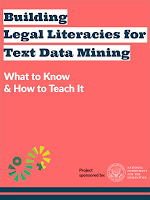Out of the National Endowment for the
Humanities Institute entitled Building Legal Literacies for Text Data Mining has emerged this digital book of the same name. The book, Building Legal Literacies for Text Data Mining, was edired by Rachael Samberg and Timothy Vollmer, and published by the University of California Berkeley Press in 2021. It carries a Creative Commons 0 (Zero) license. The site says:
To the extent possible under law, Scott Althaus; David Bamman; Sara Benson; Brandon Butler; Beth Cate; Kyle K. Courtney; Sean Flynn; Maria Gould; Cody Hennesy; Eleanor Dickson Koehl; Thomas Padilla; Stacy Reardon; Matthew Sag; Rachael Samberg; Brianna L. Schofield; Megan Senseney; Timothy Vollmer; and Glen Worthey have waived all copyright and related or neighboring rights to Building Legal Literacies for Text Data Mining, except where otherwise noted.Yes, the entire book is online AND can be downloaded in several formats. Below is the introduction, which might peek your interest or the interest of someone at your institution.
INTRODUCTION
Until now, humanities researchers conducting text data mining in the U.S. have had to maneuver through a thicket of legal issues without much guidance or assistance.
UC Berkeley Library led more than a dozen institutions in submitting (and receiving) a grant to create a National Endowment for the Humanities Institute entitled Building Legal Literacies for Text Data Mining (Building LLTDM). We wanted to empower digital humanities researchers and professionals (librarians, consultants, and other institutional staff) to confidently navigate United States law, policy, ethics, and risk within digital humanities text data mining projects—so that they could more easily engage in this type of research and contribute to the advancement of knowledge.
On June 23-26, 2020, we welcomed 32 digital humanities researchers and professionals to the institute. After months of preparation, we had been looking forward to working and learning together at UC Berkeley, but the world had other plans. Due to the global health crisis, we had to transform our planned in-person, intensive workshop into an interactive and relevant remote experience.
The pandemic meant we had to transition everything online. The substantive content was pre-recorded and delivered in a flipped classroom model. Faculty created a series of short videos, and shared readings relevant to the legal literacies. We also provided the video transcripts and slides to participants to promote accessibility and accommodate multiple learning styles.
This book explores the legal literacies covered during the virtual institute, including copyright (both U.S. and international law), technological protection measures, privacy, and ethical considerations. It describes in detail how we developed and delivered the 4-day institute, and also provides ideas for hosting shorter literacy teaching sessions. Finally, we offer reflections and take-aways on the institute.

No comments:
Post a Comment